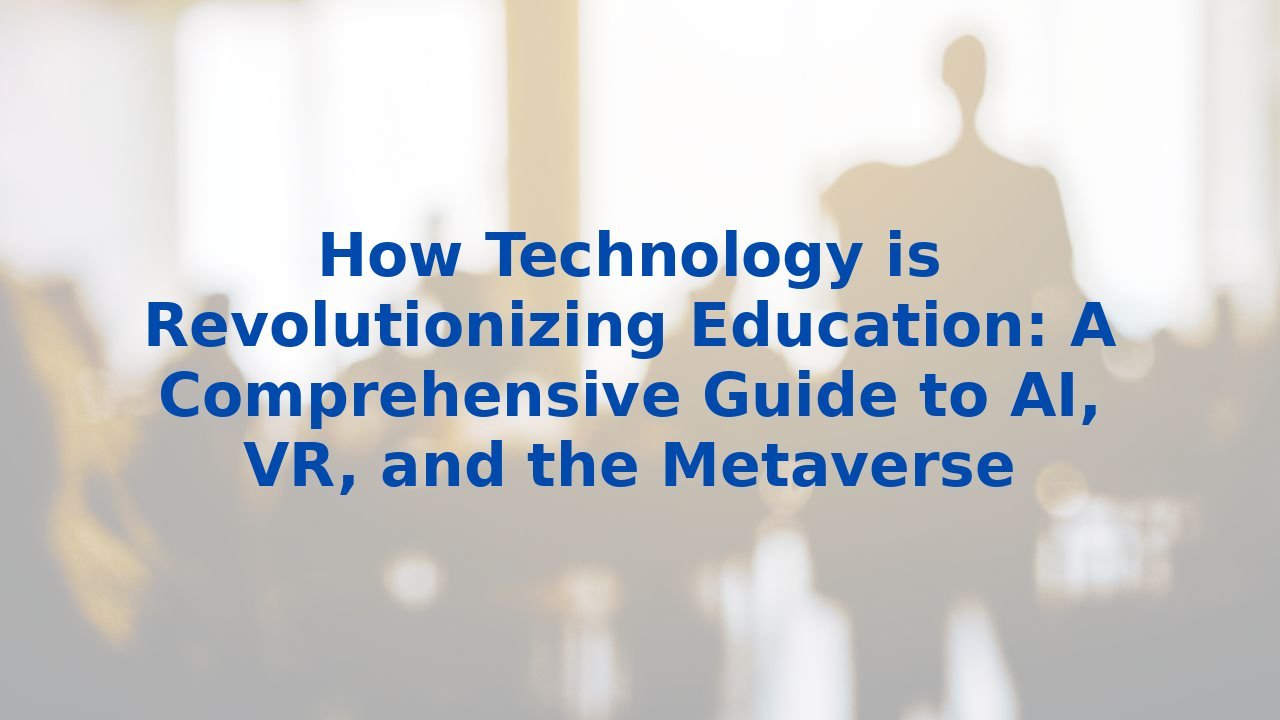How Technology is Revolutionizing Education: A Comprehensive Guide to AI, VR, and the Metaverse
How Technology is Revolutionizing Education: A Comprehensive Guide to AI, VR, and the Metaverse
The rapid advancement of technology is reshaping every sector, and education is no exception. As we step into an era defined by innovation, tools like artificial intelligence (AI), virtual reality (VR), and the metaverse are becoming integral components of the learning landscape. This comprehensive guide explores how these technologies are transforming education and enhancing business processes, making learning more efficient and engaging for both students and educators.
The Role of AI in Education
Artificial intelligence is driving a paradigm shift in educational methodologies. Imagine a classroom where learning experiences are tailored to the needs of each individual student. AI algorithms accomplish this by analyzing learning styles, strengths, and areas needing improvement. With such data-driven insights, educators can create personalized educational paths, significantly optimizing student outcomes.
Furthermore, AI’s capability to automate repetitive tasks—like grading quizzes or organizing schedules—enables educators to redirect their focus toward high-impact teaching methods. This doesn't mean teachers will be replaced; rather, they will evolve into facilitators of knowledge, developing innovative pedagogical strategies while providing much-needed emotional and social support to their students.
The Impact of VR in Education
Virtual reality is changing the educational landscape by offering immersive experiences that deepen comprehension. Imagine stepping into a VR environment where you can walk through historical sites, conduct chemistry experiments, or even perform virtual surgeries—without the risks associated with real-life procedures. VR takes abstract concepts and makes them tangible, thereby enhancing student engagement and retention.
By creating simulations that closely resemble real-world scenarios, VR democratizes access to various learning experiences. This immersive approach transcends traditional classroom boundaries, making education more inclusive and equitable. No longer confined by textbooks and chalkboards, students can explore, engage, and learn in ways that were previously unimaginable.
The Metaverse: A New Frontier for Learning
Envision a collective virtual space where learning knows no bounds—welcome to the metaverse. This dynamic platform combines augmented and virtual realities, creating endless opportunities for interactive and collaborative learning. In the metaverse, students can attend virtual lectures, engage in group projects, and connect with peers from around the globe.
Picture a scenario where students can explore ancient civilizations in a virtual classroom or practice language skills in real-time simulations. The metaverse not only fosters a deeper understanding of subjects but also encourages cultural exchange and global collaboration. This interconnected digital ecosystem offers a rich tapestry of learning experiences, preparing students for a connected world.
Benefits of AI for Improving Efficiency
By implementing AI in educational settings, institutions can streamline various administrative processes such as enrollment, scheduling, and resource allocation. The efficiency gained through automation provides educators with the time and space to prioritize teaching and learning. It fosters a culture of innovation and responsiveness within educational institutions, resulting in a more effective educational environment.
Moreover, the use of AI can lead to significant cost savings. With optimized operations and reduced manual labor, schools can allocate resources more effectively, enabling them to offer better quality education and support services.
The Importance of Training Employees for AI
As educational institutions embrace AI technologies, the need for comprehensive training programs becomes paramount. It’s not merely about integrating technology; it’s about ensuring that educators are equipped to leverage these tools for maximum impact. Training focuses on developing critical skills in AI, data analytics, and educational technology consulting, empowering educators to curate personalized learning experiences and construct effective lesson plans.
By investing in training for faculty and staff, educational organizations can foster a climate of continuous improvement and adaptability. These skills will be essential for educators to embrace the full potential of AI and other transformative technologies.
Conclusion
The incorporation of cutting-edge technologies like AI, VR, and the metaverse is revolutionizing education as we know it. By fostering personalized learning experiences, enhancing student engagement, and streamlining administrative tasks, these innovations are setting the stage for a more efficient academic environment. However, the transformation of education requires not just new tools but also skilled educators ready to embrace and harness this technology.
Ultimately, as we navigate this sweeping technological landscape, prioritizing employee training is essential. With the right educational frameworks in place, we can equip students with fundamental digital skills while promoting a more inclusive and enriching learning atmosphere. The future of education is bright, and it’s ours to mold, one technological leap at a time.



